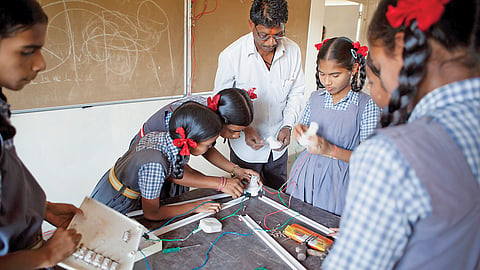JP Morgan partners with Lend A Hand India to create employment and entrepreneurship opportunities
Investment banker J.P. Morgan launched New Skills at Work, a global $250 million commitment over five years, in 2013. It aimed to identify strategies and support data-driven solutions to help improve labour market infrastructure and develop skilled workforces. It focussed on supporting demand-driven vocational skills training and placements for youth in high growth sectors, improving their employability and helping them to build well-structured career paths.
To achieve scale and sustainability, the bank aligned with government initiatives through Public-Private Partnerships that introduced vocational skills into the education systems to both complement and enhance existing curricula.
A partnership with Lend A Hand India (LAHI), a non-profit organisation, helped create employment and entrepreneurship opportunities for India’s rural youth.
In India, one in two students from low-income families dropout of school after completing Grade 10. In rural India, the incidence of dropouts is more, as either high schools are far away or at times the family is too poor to pay the fees. With such basic education, most of these young men and women only get jobs in the informal sector, usually, the first one they can find, or which other members of their family are doing. To address this complex set of issues, in 2014, J.P. Morgan provided LAHI a small grant to help implement a multi-skilling vocational training programme for students of Grades 8-10.
With the financial support from J.P. Morgan, LAHI set out to skill children in 20 government schools in Maharashtra. The idea was to leverage existing school infrastructure and complement secondary schooling with skills education to ensure employability of rural children. The programme provided job-oriented skills including light engineering such as carpentry, welding, mechanic work; landscaping and gardening; electrical and energy; and food processing.
Research showed that the students, who went through the multi-skilling vocational education programme, were three times more likely to take up vocational education as a career choice after 10th class. They were also three times more likely to be self-employed.
Its success convinced LAHI to launch a programme called Catalyst for a rapid scale-up of the project. The vocational skilling programme was expanded to 500 government schools, reaching 25,000 students in Maharashtra.
Thereafter, LAHI approached the Central government proposing similar skilling programmes for other states. The Central government instructed 29 states to embed vocational skilling within the school curriculum of government schools. While lahi was asked to help 23 state governments make this possible, J.P. Morgan expanded its support to lahi for another two states – Delhi NCR and Telangana.
In addition to funding the vocational training, volunteers from J.P. Morgan went into 12 schools in Mumbai to revamp their learning environment. They helped improve the infrastructure, train the teachers and introduce students to new-age learning techniques.
Volunteers helped the schools in unique ways like physical education, creating a powerful experience of success and failure and learning and growth through football. Classrooms were bustling with purpose during the school holidays, as they helped refurbish the infrastructure from tables and chairs to computer labs and libraries.

